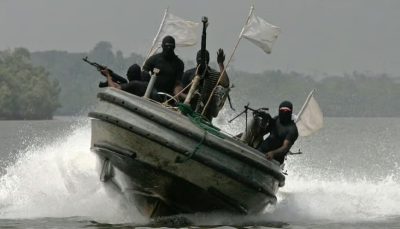How Tompolo helped Tinubu fix Nigeria’s Rivers State crisis

Pipeline blasts came and went. But with the former leader of the now-defunct Movement for the Emancipation of the Niger Delta (MEND) on the president’s side, the turmoil didn’t spread.
When the political feud between Rivers State Governor Siminalayi Fubara and his estranged godfather, Nyesom Wike, escalated in March, the intervention of Niger Delta militants sparked fears of a return to armed sabotage in the oil-rich region.
With a Supreme Court victory under his belt, Fubara had appeared politically secure. But lawmakers loyal to Wike, backed by federal muscle, seemed poised to remove him from office. As the crisis deepened and assumed an ethnic tone, some Ijaw militant groups aligned themselves with Fubara, threatening to disrupt oil production unless President Bola Tinubu reined in Wike.
Despite the militants’ bluster, the situation quickly de-escalated. The reason? High Chief Government Oweizide Ekpemupolo, better known as Tompolo.
The Tompolo factor
Once a fugitive, Tompolo is now a key government ally thanks to a lucrative N48bn pipeline surveillance contract awarded by President Muhammadu Buhari and renewed by Tinubu. His company, Tantita Security Services, is now critical to federal efforts to protect oil infrastructure and to keep the restive Niger Delta calm.
Fubara is coming back
But that calm was tested between 17 and 18 March, when two major oil pipelines were bombed within 24 hours. The attacks were widely interpreted as a warning shot from pro-Fubara militants frustrated with Wike’s continued influence in Rivers State and what they saw as federal interference.
A day earlier, a video had circulated of AK-47-wielding men from a group calling itself the Niger Delta Rescue Movement chanting the Ijaw war cry “Asawana, Asawana,” urging non-indigenes to flee Rivers for their safety.
Unlike in 2016 when similar attacks crippled oil production during a federal crackdown on Tompolo, this time the violence fizzled. Activists and analysts say Tompolo’s influence over ex-militant networks helped avert escalation.
‘Without Tompolo, the region would be burning’
Sheriff Mulade, a Niger Delta activist and national coordinator of the Centre for Peace and Environmental Justice (CEPEJ), links the quick de-escalation to the moderating influence of ex-militant leaders, particularly Tompolo, now a government ally.
He argues that Tinubu’s declaration of emergency rule on 18 March, which saw Governor Fubara suspended for six months and retired naval officer Vice Admiral Ibok-Ete Ibas installed as Sole Administrator, would not, on its own, have been enough to contain the threat.
“The pipeline attacks were politically motivated,” Mulade tells The Africa Report, “but local surveillance outfits like Tompolo’s Tantita stopped the crisis from spreading. Without them, it could have escalated to Bayelsa, Delta and Ondo states.”
That assessment aligns with past precedent. In 2016, government efforts to prosecute Tompolo sparked a wave of coordinated attacks on oil installations, halving Nigeria’s daily production. Only after back-channel negotiations and multimillion-dollar surveillance contracts did the sabotage stop.
I know Tompolo has a lot of influence, he’s popular among his kinsmen, activists, monarchs and youths
Since former President Umaru Yar’Adua’s 2009 amnesty deal, successive governments have maintained close ties with former militant leaders like Tompolo, Asari Dokubo, and Ateke Tom, who is now a traditional monarch. The strategy has largely paid off, ensuring peace in a region that once regularly disrupted global oil markets.
According to Dokubo, Tompolo’s relationship with the federal government dates back to President Goodluck Jonathan’s tenure, when he was paid $144m annually to protect pipelines.
Behind the scenes of Rivers détente
Tompolo is believed to have played a quiet but influential role in dialling down tensions in Rivers. His contract, which directly benefits hundreds of Ijaw youths and ex-militants, gives him significant leverage in the region.
“I know Tompolo has a lot of influence,” says veteran Niger Delta journalist Godswill Kordoo. “He’s popular among his kinsmen, activists, monarchs and youths.”
Ijaw Youth Council spokesman Binebai Princewill confirms that many Ijaw groups chose restraint over retaliation even after Tinubu suspended Fubara because of the economic ripple effects of Tompolo’s deal.
In an April interview with Arise TV, Tompolo gave a rare public assurance: “The duly elected Governor of Rivers (Fubara) is coming back… Our president is one person who has been protecting democracy… Fubara is coming back as governor.”
Recent developments appear to confirm that prediction. Fubara has since visited both Wike and Tinubu, signalling a possible political thaw. Last week, he praised Tinubu’s intervention despite ongoing litigation at the Supreme Court and followed up with a visit to the president’s Lagos residence.
The wide grin in the photos from that meeting echoed Tompolo’s prophecy: “Fubara is coming back.”
(The Africa Report)

